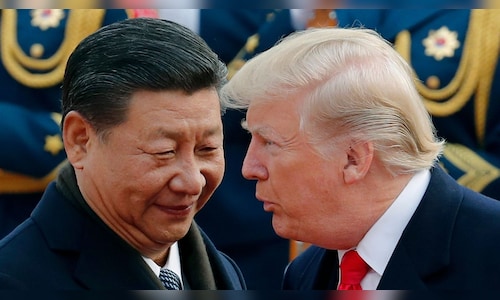Speaking to CNBC-TV18 about the shifting dynamics of US-China trade relations, Rein noted that US President Donald Trump has a “pathological desire” to secure a deal with China, primarily to bolster his appeal among his core supporter base.
Rein highlighted that Trump’s approach to trade with China is perceived more favourably by the Chinese business community compared to that of former President Joe Biden and former Vice President Kamala Harris. Under the Biden administration, Chinese businesses have faced scrutiny over national security concerns, human rights issues, and economic competition. By contrast, Trump’s stance is seen as transactional, offering a path forward for Chinese businesses seeking access to the US market.
Rein pointed to Trump’s recent comments, where he suggested that while he does not want Chinese electric vehicles exported to the US, he would welcome Chinese companies setting up factories and hiring American workers.
While it remains unclear when a deal will be reached, Rein believes that negotiations will eventually lead to an agreement. This belief is reinforced by Trump’s previous trade deal with China during his first term, where China committed to purchasing $200 billion worth of US goods and reducing trade barriers.
Rein also touched on a significant meeting chaired by Chinese President Xi Jinping, where prominent Chinese business leaders, including Alibaba’s Jack Ma, were in attendance. The meeting marked the first such engagement in seven years, signalling a potential shift in China’s economic policy. Rein described the gathering as a “huge, significant meeting” that sought to reassure both domestic and international investors about the government’s commitment to private enterprise and economic growth.
For years, there has been uncertainty among Chinese entrepreneurs regarding the state’s stance on capitalism, leading to decreased investment and economic slowdown. Rein believes that the recent meeting serves as a strong signal that the Chinese government is once again embracing the private sector as a key driver of economic growth.
Einar Tangen, Senior Fellow at the Taihe Institute and Founder of Asia Narratives, echoed this sentiment, emphasising that China is actively working to attract foreign investment. He noted that the government is implementing measures to facilitate business operations, including allowing foreign companies to borrow from Chinese banks and cutting bureaucratic red tape.
While acknowledging the significance of Xi Jinping’s meeting with tech leaders, Tangen stressed that China’s economy remains state-driven rather than private-sector-led, unlike in the US. Nonetheless, the government’s recent policy moves indicate a more business-friendly approach aimed at revitalising China’s economy.
Below are the excerpts of the discussion.
Q: Looking at the larger possibility of a US China trade war. How do you see statements which have been coming from Donald Trump, saying that he wants to have a good relationship with China, he’s also reviewing what had been achieved during the previous trade deals as well, will things be as bad as they were last time around?
Rein: Chinese tend to prefer Trump than they prefer Joe Biden and Kamala Harris. When it came to Biden, they thought that Biden was an ideologue. He was an imperialist because of great power relations, he wanted to contain China’s economic rise and destabilise the CPC. If you look at it, when the Chinese got good at apps, like Tiktok, the Americans under Biden called it a national security threat, when the Chinese got good in cotton- the Americans under Biden said genocide, forced labour. So, there’s a feeling under Biden and Harris that there would be 20 years of a Cold War. But when it comes to Trump, there’s a feeling that a deal can be made.
I’ll give an example. Trump has said, I don’t want the Chinese to export their vehicles to the United States. I want them to build factories in the US, hire American workers and create economic growth in the United States. Now that’s fair. That’s what the Chinese did to Ford and GM in the 1990s and they said, if you want to get access to the Chinese middle class, you have to build factories in China. That’s what Trump is saying and dangling a carrot to the Chinese business community and government. So, the Chinese just want a pathway. They want a way to be able to do business in the United States, whether it be selling a 50% stake of Tiktok so they can open up there. So, there’s a feeling that a deal can be made with China and the United States.
Now here’s the thing. I don’t know if a deal is going to be made in year one, year two or year three, but it’s clear that Trump has a pathological desire to get a deal done, and to say to MAGA, I beat the Chinese a deal will be made in the coming years.
Q: In the meeting of tech CEOs that was chaired by Xi Jinping, you had Jack Ma, you had CEOs from Xiaomi, Tencent, all present over there. What are the big takeaways and what’s the larger message and significance of this meeting?
Rein: It’s a huge, significant meeting. If you think about it, Xi Jinping himself hasn’t met with the larger Chinese business community in a symposium like this since 2018. So, for seven years now, Chinese entrepreneurs and businessmen and investors have been wondering, has China turned more anti-business? Is it not capitalist? Is it okay to be rich? And that’s why you’ve seen some of the animal spirits in China have gone down over the last few years. So, it was a very important meeting for Xi Jinping to pop up and meet with Jack Ma and show a strong signal to domestic investors and international investors that, it’s okay to try to be greedy again. It’s okay to try to make money. And importantly, the Chinese government is going to work with the private sector to try to spur the economy again. Because it is bad. You saw that retail sales only grew 3-4% in 2024, fixed asset investment was anaemic around 0.1% on the private sector side, because Chinese consumers and Chinese small business owners have lost their animal spirits. That’s why this week huge signal change for the Chinese economy
Q: What do you think will be Xi Jinping’s push in terms of economic policy? Now that he met all these tech CEOs, he said that he appreciates the work that you do, given the significance of that meeting, what is the kind of policy shift that we could possibly see in the coming days?
Tangen: What they’ve done is, they’ve already indicated that they’re taking measures to try to encourage foreign investment, and that includes allowing foreign companies to borrow from Chinese banks in order to do business here in China, that’s a huge issue, as well as other things, reducing red tape, etc. So, they’re signalling that China is open for business. They’ve been doing that for quite some time.
I do agree that this was a very important optical event in terms of meeting with the entrepreneurs, but at the end of the day, China is run by the government and not by private enterprises. This is not the United States.
Watch accompanying video for entire discussion.


